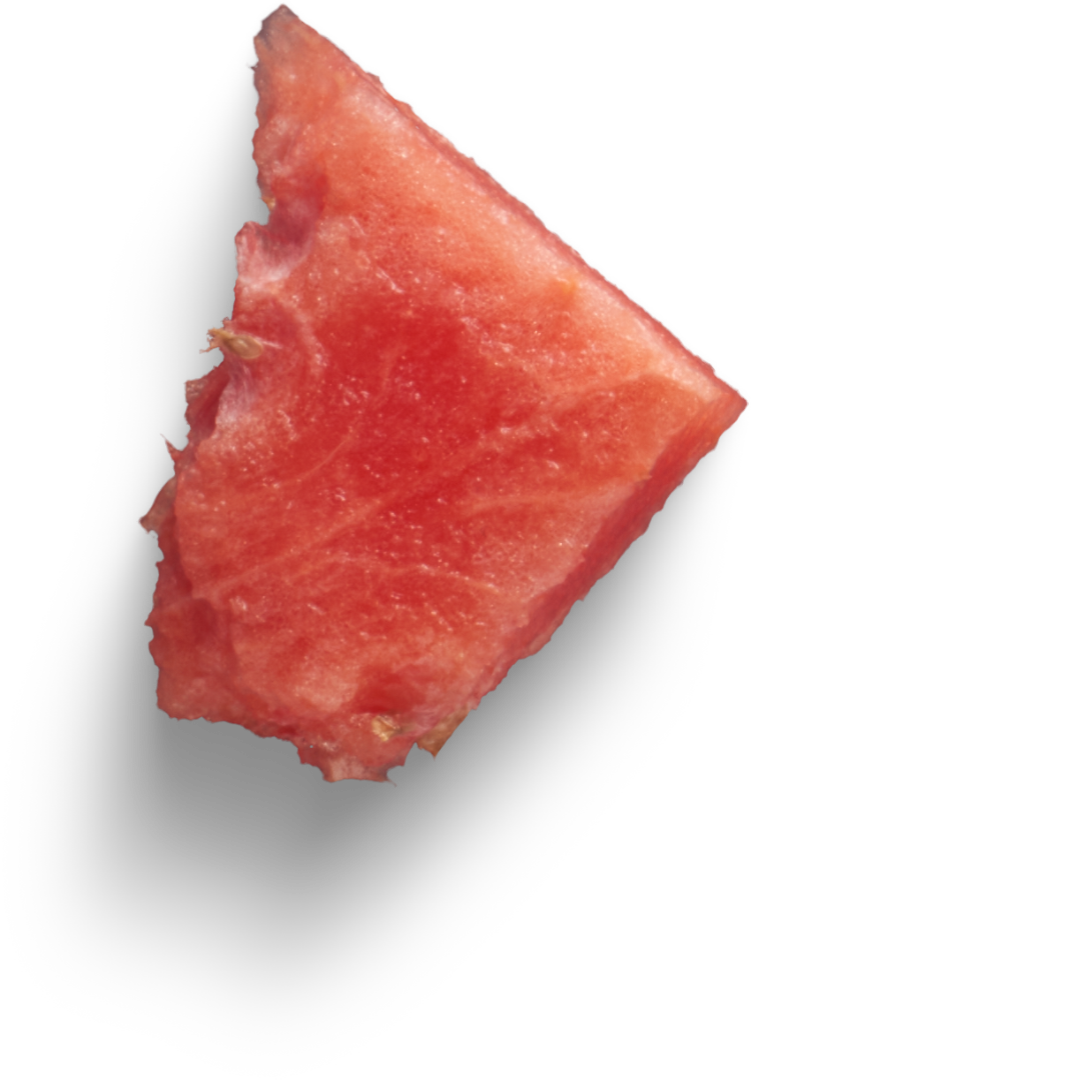Harvest Spotlight
Watermelon
Sugar+Water+Vitamins
“Citrullus lanatus”
The Ultimate Guide to Watermelon:
Health Benefits, Varieties, and Fun Facts
Watermelon, a beloved summer staple, is more than just a refreshing fruit. Bursting with flavor and nutrients, it is enjoyed worldwide for its juicy sweetness and numerous health benefits. In this comprehensive guide, we'll explore everything you need to know about watermelon, from its varieties and nutritional profile to fun facts and delicious recipes. We'll also give you a closer look at our some of our family’s tips and tricks for growing watermelon.
Nestled in the sunny heart of California, Murray Family Farms has been perfecting the art of watermelon growing for five generations. That’s right—while your great-grandparents were figuring out how to turn on the radio, ours were already knee-deep in watermelon vines, whispering sweet nothings to each juicy fruit. As a family-owned and operated farm, our secret to success is simple: combine sustainable farming practices with a splash of love and a dash of humor. Our watermelons aren’t just high-quality and delicious—they’re practically celebrities in the world of produce. So, next time you bite into one of our watermelons, remember, you’re tasting over a century of farming expertise, a lot of sunshine, and perhaps a few family secrets.
We are Watermelon Whisperers.
Hydration Hero: The Health Benefits of Watermelon
Watermelon is not only a tasty treat but also a powerhouse of health benefits. Here are some key reasons to include watermelon in your diet:
Hydration Station: Composed of about 92% water, watermelon is an excellent way to stay hydrated, especially during those sizzling summer days. It’s like nature’s own water bottle, but tastier.
Nutrient Dynamo: Packed with vitamins A, B6, and C, as well as antioxidants like lycopene and amino acids, watermelon is a nutritional overachiever.
Heart’s Best Friend: Lycopene, the antioxidant giving watermelon its red hue, is linked to reduced heart disease risk. It’s like a love letter to your heart in every bite.
Inflammation Fighter: The antioxidants in watermelon help combat inflammation and oxidative stress. Think of it as your body’s internal fire extinguisher.
Beauty Booster: Vitamins A and C are essential for healthy skin and hair. Watermelon helps keep skin supple and hair strong, so you can glow from the inside out.
Digestive Delight: The fiber in watermelon supports healthy digestion and keeps things moving smoothly. You could say it’s the original gut guru.
Watermelon Wonderland
Exploring Varieties
Watermelon comes in several varieties, each with unique characteristics:
Seedless Sensation: Easy to eat and popular for their convenience, seedless watermelons are typically sweeter and have a smooth texture. Murray Family Farms specializes in cultivating these crowd-pleasers.
Picnic Perfect: These large, round or oblong melons are perfect for gatherings and can weigh between 15 to 50 pounds. They’re the life of the party.
Icebox Delight: Smaller and more manageable, these watermelons are perfect for small families and can weigh between 5 to 15 pounds. They’re big on flavor, small on space.
Colorful Cravings: Yellow and orange watermelons have a distinct, sweet flavor and a bright yellow or orange flesh. Murray Family Farms offers these unique varieties for a delightful twist on the classic red.
Mini Marvels: Also known as personal watermelons, they are small, sweet, and perfect for individual servings. Think of them as the fun-size candy of the fruit world.
Refreshing
Watermelon Facts!
Take a bite of these fantastic facts courtesy of our favorite family farm!
Ancient Origins: If it weren’t for this renessaince era painting of watermelon, we would never have a glimpse of how watermelon USED to look before years of human selection for EXTRA JUICY traits!
Space Snack: Nasa and the office of the president briefly reported that watermelon had been found on Mars, causing the New York Times to release a very embarrassing article. It was later revealed to be a mistake!
Record-Breaker: The heaviest watermelon ever recorded weighed 350.5 pounds. But did you know that giant watermelons are actually their own variety? Historically, watermelon cultivars bearing giant fruit weighing more than two hundred pounds have been bred specifically for fruit competitions at State and local agricultural fairs.
Watermelegend: The Watermelon Prince, a rousing story from Vietnam tells the story of a prince who reclaims his throne with the help of our favorite fruit.
Once upon a time, An-Tiem, the sixth son of King Hung Vuong the Fifth, disobeyed his father's orders and was exiled to a deserted island. There, he built his shelter, dug a well, and hunted for food. One day, he discovered a large green fruit with red flesh but hesitated to eat it, fearing it was poisonous. During a dry season, desperate with thirst, he finally tasted it and found it delicious and refreshing. An-Tiem cultivated the fruit, soon covering the island. He carved his name and the island's name on some of the fruit and threw them into the sea. Seamen found the fruit, and word spread to the mainland, attracting merchants and transforming the island into a bustling hub. Hearing of his son's resilience, King Hung Vuong proudly summoned An-Tiem back to the court. An-Tiem brought the fruit as an offering, and the King, impressed, made him King Hung Vuong VI. The fruit, named "dua hau," became a symbol of luck and a cherished New Year gift.
Grow your own
Preparing Your Garden
To ensure your watermelons thrive, proper garden preparation is essential. Follow these steps:
Choose a Sunny Spot: Watermelons need at least 8-10 hours of sunlight daily.
Soil Preparation: Ensure well-draining, sandy loam soil with a pH between 6.0 and 7.5. Amend the soil with compost or organic matter to boost fertility.
Space Wisely: Watermelon vines can spread extensively, so provide ample space. Plant seeds or seedlings about 6 feet apart in rows spaced 7-10 feet apart.
RIPE!
Planting Watermelon Seeds
Timing and technique are crucial for successful watermelon planting:
Timing: Plant watermelon seeds after the last frost date when soil temperatures are consistently above 70°F (21°C).
Sowing Seeds: Plant seeds 1 inch deep in hills or mounds. Place 2-3 seeds per hill and thin to the strongest seedling after germination.
Transplants: If using seedlings, transplant them carefully to avoid root disturbance.
Watering and Feeding Your Watermelons
Watermelons require consistent moisture and nutrients:
Watering: Provide deep watering once a week, ensuring the soil remains moist but not waterlogged. Reduce watering as fruit matures to concentrate sugars.
Feeding: Apply a balanced fertilizer at planting and switch to a low-nitrogen, high-phosphorus fertilizer as vines start to flower.
Managing Pests and Diseases
Protect your watermelon plants from common pests and diseases:
Pests: Watch out for aphids, cucumber beetles, and squash bugs. Use organic insecticides or introduce beneficial insects like ladybugs.
Diseases: Prevent fungal diseases by watering at the base of plants and ensuring good air circulation. Use fungicides if necessary and rotate crops annually.











